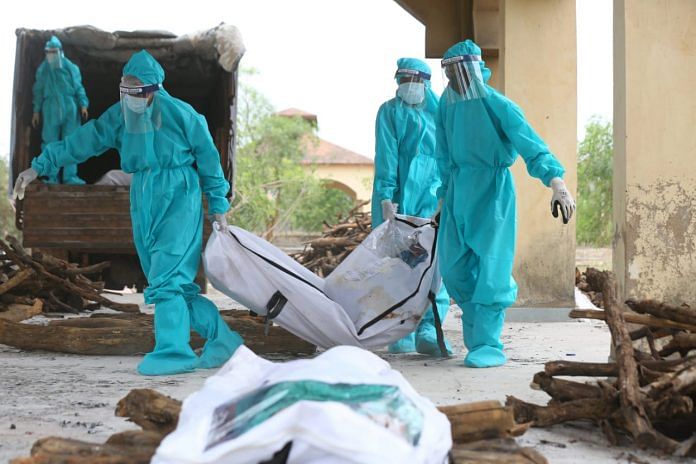New Delhi: The central government has declined to modify its existing guidelines for disposal of bodies of those who die of Covid-19, to accommodate funeral rituals followed by the Parsi community.
The Parsis had sought exemption from the government protocol of cremating or burying those who die of Covid, on the ground that the tradition — in the Zoroastrian faith they practice — calls for natural decay of the dead at specially designed towers, known as the Towers of Silence.
In an affidavit filed before the Supreme Court, the Union Ministry of Health and Family Welfare submitted that according to the standard operating procedure prescribed, bodies of those who die due to Covid should be either buried or cremated, to prevent the spread of infection from the dead body to those handling it.
The government document was filed in response to a petition by the Gujarat-based Surat Parsi Panchayat Board last month, which sought the top court’s intervention to allow last rites in line with the community’s traditions.
The SC had, on 10 January, sought the assistance of Solicitor General Tushar Mehta in the matter, after the petitioner’s counsel — senior advocate Fali S. Nariman — had proposed guidelines to meet the concerns of the Union government over public health and safety, while preserving the sanctity of the Zoroastrian faith practiced by the Parsis.
Nariman had argued that the protocol issued by the Centre did not take into account the concerns of the Parsi community in regard to the “modalities ordained for funeral rites”.
During a hearing Monday, Nariman told the bench that the petition was not adversarial, adding that the suggestion given by the petitioner mentioned the rules of the Parsi community and the Centre could take a call in view of the same, to permit proper last rites to be conducted.
The bench led by Justice D.Y. Chandrachud then advised Mehta — who appeared for the Centre — to convene a meeting with the petitioner to thrash out a suitable protocol that would allow the Parsis to practise their faith while performing last rites of bodies of the Covid dead. The bench has scheduled the next hearing on the matter for 21 January.
‘Appropriate handling of Covid bodies critical for public health’
In its affidavit, the Centre has now rejected Nariman’s suggestions. Prepared by advocate Rajat Nair, the affidavit said the last rites ceremony in the Parsi community involves exposing the body, which could contain active traces of the coronavirus, to the professional pallbearers who carry the dead. This could lead to the further spread of the virus, it stated.
If bodies of Covid patients are not buried or cremated, they will be exposed to the environment and animals and could potentially establish a reservoir of SARS-CoV-2 in wild or domestic animals that would pose a risk to the health of humans and also lead to “spill over events” in humans, the affidavit said.
Quoting a research by the World Organisation for Animal Health, the Centre stated that both suspected and confirmed Covid patients are advised to minimise direct contact with animals, including wildlife.
“It has also been observed that several animal species have demonstrated susceptibility to the virus through experimental infection, and in natural settings when in contact with infected humans. Although these infections are not the driver of the current Covid-19 pandemic which is human-to-human transmission. There is also evidence that infected animals can transmit the virus to other animals in natural settings through contact, such as mink to mink transmission, and mink to cat transmission,” the affidavit submitted.
The introduction of the virus to a new animal species from a dead body might accelerate its (the virus’) evolution, which could “potentially impact on the surveillance and control strategies,” noted the affidavit, adding that there were “valid concerns” over transmission of the virus in case Covid bodies are not disposed of in an appropriate manner.
The basic elements of the existing guidelines to conduct last rites of dead bodies, issued in consultation with the Indian Council for Medical Research (ICMR), was to ensure the infection is not transmitted to those handling the bodies, stated the affidavit. This was done because the virus, according to scientific evidence, can survive on a dead body, in bodily fluids, secretions and moist cells of the dead body for up to nine days, it added.
“A dead body will be considered as an inanimate surface and secretions from orifices will carry infected cells and will remain smeared on the body surfaces after death. It is thereby submitted that appropriate handling of dead bodies of Covid positive patients, therefore, remains critical from a public health perspective,” said the affidavit.
(Edited by Poulomi Banerjee)
Also read: ‘It is about journey of soul’ — Parsis seek exemption, want Covid funerals on their terms



